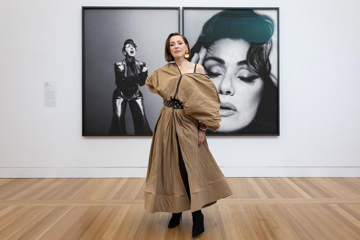Live Review: Xiu Xiu Plays The Music Of Twin Peaks
"between the howls of distortion and the unsettling beats are resolutions so sweet and obvious they ache of innocence lost."

The score by Angelo Badalamenti stood as a counterpoint to the underlying threat of Twin Peaks. There was sadness in the music, and fear and eroticism, but above all there was a saccharine sweetness that made the eventual revelations all the more grotesque.
As part of the David Lynch exhibit currently running at GoMA, avant-pop maestros Xiu Xiu were invited to revisit that soundtrack to Twin Peaks and present their own version in the cinema in which Lynch’s films are being screened.
Without the show itself to play against, Xiu Xiu have adapted that unsettling tone, that sense of danger, as an explicit part of the music. This is the score as it could have been: if viewers had known what was coming; if the writers had chosen to foreground the pain. It’s still based on Badalamenti’s original work though, meaning that between the howls of distortion and the unsettling beats are resolutions so sweet and obvious they ache of innocence lost.
There are few pieces of vocal work within the show’s soundtrack, but Xiu Xiu use them wisely: peppered throughout the performance, they let the band straddle the line between pop set and live score. Sycamore Trees strips back the music of the original, changing the intent of the song. “I’ll see you, and you’ll see me” becomes a threat, where once it felt like a cry of loss. And Falling, the iconic song that originally featured Julee Cruise, sweeps from minimalism to a crescendo of anguish. The instrumental pieces are perfect adaptations, retaining enough of the original to be recognisable, but changed into something new, something distinctly Xiu Xiu, as the band swaps between the vibraphone, guitar, keyboards, drums and electronics arrayed across the stage.
The visuals are the only let-down of the night. Three looped scenes – waving trees, a staircase and a revolving fan – play out behind the band, and while they’re inoffensive, it feels like a missed opportunity. Fortunately Jamie Stewart is more than interesting enough to make up for it.
Don't miss a beat with our FREE daily newsletter
Stewart is one of the industry’s most magnetic front-people. Throwing his ‘self’ into every song, he becomes the embodiment of its emotion. Even in the pauses between tracks there’s an intensity to him that draws the eye. While singing, Stewart curls forward, leaning on toe-tip into the mic, eyes rolling back in his head – he manages at various points to recall both Laura and Bob. It’s easy to forget how impressive Stewart’s voice is too, buried as it often is behind noise, or hidden in a whisper, but his range is on full and impressive display tonight.
The set ends on an unexpected note – a reading of the diary of Laura Palmer, which cuts out to Stewart’s unamplified rendition of Mairzy Dotes. It’s a perfect finale, even if, as with so much of the concert, it seems almost too raw for applause.







